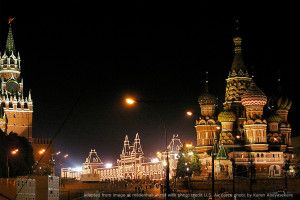A law beyond improvement; Defining “political activity” may seem like an academic exercise, but in Russia, it is an existential one.

Defining “political activity” may seem like an academic exercise, but in Russia, it is an existential one.
(opendemocracy.net – Tanya Lokshina – February 8, 2016)
Tanya Lokshina is Russia program director at Human Rights Watch.
In May 2013, as Russia was craving positive international publicity before the Sochi Olympic Games, the secretary general of the Council of Europe, Thorbjorn Jagland, criticized Russia’s “foreign agents” law for the “chilling effect” it could have on the country’s civil society. After meeting with President Vladimir Putin, Jagland told the media: “I have expressed concerns about this [law], and I think it is very important… how political activity is being defined.”
Vladimir Putin, who had been back in the Kremlin for a year and had already unleashed a vicious campaign against critics of the government, did not disagree that the definition in question could benefit from some improvement. Almost three years later, the saga seems to be drawing to a close, and not in a good way.
Vague definitions
Defining “political activity” may seem like an academic exercise, but in Russia, it is an existential one. The definition is crucial to the law, which has become the centre piece of the government’s sweeping crackdown on free expression. Non-governmental groups are branded as “foreign agents”, which in Russia is the equivalent of “spy” or “traitor”, if they engage in “political activity” while receiving foreign funding.
The 2013 law’s definition of “political activity”, actions aimed at influencing the government or public opinion, was very broad and vague. The wording could cover all aspects of advocacy and human rights work. Putin’s international interlocutors hoped the solution would be to get the Russian authorities to narrow the definition so that it would exclude human rights and other advocacy work.
The Kremlin proved generous with promises. Every the time issue came up, Putin and other high level officials kept reassuring their foreign partners that the definition would eventually be fine-tuned. Meanwhile, the Justice Ministry kept designating more of the country’s vibrant independent groups as “foreign agents”, treating any type of government advocacy or public outreach as “political activity.”
At the start of 2016, the Russian Justice Ministry’s “register of foreign agents” includes more than 100 non-governmental groups, including leading human rights organisations. Some of the groups on the list did not even have foreign funding, but the authorities argued that their members at some point in the past received foreign funds or were somehow associated with something foreign. Dozens have paid hefty fines for failing to mark all their publications and online materials as “produced by a foreign agent organisation,” as the law requires. Close to 20 civil society groups across the country have stopped working, including St Petersburg’s Anti-Discrimination Center Memorial and the Committee Against Torture. These groups have refused to identify themselves as something they clearly were not.
Russia’s international partners have remained hopeful that Russia would develop a new definition of political activities. Just two months ago, I was at a diplomatic dinner in Moscow and heard officials around the table refer to Putin’s repeated promises to clarify the term. “My sources are telling me it’s going to happen first thing next year,” one of them said.
And so it did. At the end of January, the Justice Ministry issued a proposed, new definition of “political activity” to include in the “foreign agent” law. This definition is very specific indeed. It says loud and clear that no matter whether you carry out legal or policy analysis, monitor the work of government institutions, do public opinion surveys, engage in research, petition government officials, etc. – as long as those efforts are aimed at somehow influencing the government or public opinion, they constitute political activity.
Instead of narrowing the definition, the ministry details the many ways in which it has been enforcing the profoundly flawed law for the past three years. This proposed definition is what Russia’s international interlocutors are getting in return for their long, patient wait. It is as if the government is saying: “You wanted a new, clear definition – we took a long time but finally elaborated one that we find particularly convenient for our purposes.” And there is little doubt by now, that those purposes are first and foremost about paralysing independent civic activity in the country.
International organisations and leading democratic governments should realise that it makes no sense to wait for good amendments to be written into this intrinsically bad law. They should not be asking Putin to tinker with it. They should say clearly, in one voice, that the law on “foreign agents” runs contrary to the government’s international human rights obligations and that Russia should do away with it.
Article also appeared at opendemocracy.net/od-russia/tanya-lokshina/law-beyond-improvement bearing the following notice:
 This article is published under a Creative Commons Attribution-NonCommercial 4.0 licence. If you have any queries about republishing please contact us. Please check individual images for licensing details.
This article is published under a Creative Commons Attribution-NonCommercial 4.0 licence. If you have any queries about republishing please contact us. Please check individual images for licensing details.
